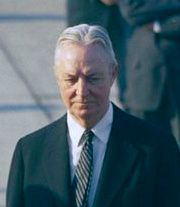A Quote by David K. E. Bruce
I thought that in general we in the United States were too optimistic in believing that the Soviets might alter what had been for a long time, as a matter of fact for centuries, fundamental Russian policies in respect to the rest of the world.
Related Quotes
I was used on a number of occasions by the United States and China as a conduit. For instance, I was up there talking with the Chinese leadership and they said to me that they were a bit concerned that the Americans had a misunderstanding about their relationship with the Soviets. There was some suggestion that there was a rapprochement developing between China and the Soviets, but nothing could have been further from the truth.
The fact of the matter is we went after Iraq for oil. And the fact of the matter is that the United States has degraded our role as a great nation by attacking this nation that had no capacity to attack the United States and no intention of doing so, that didn't have anything to do with 9/11, didn't have weapons of mass destruction.
Oil policy, policy toward the United States, policy toward Iran, Bahrain, Yemen, very unlikely, I think, to see significant change. These policies were the policies that had a wide family consensus. The question I think would be if the king becomes sick, whether you have weak Saudi leadership in the Arab world and the Middle East rather than strong Saudi leadership, but I think the fundamental policies will continue, the ones we’re familiar with under King Abdullah.
The United States is the greatest threat to world peace, and has been for a long time, and not merely because it is the world's only superpower. Equally important, the United States is also far more disposed to use its power than any other powerful nation currently is. Though Americans are culturally and emotionally blind to the fact, the mere intrusion of US power is, in and of itself, destabilizing.
I believe the number is 70% of the world's refugees since World War II have been taken in by the United States. Every year, year in, year out, the United States admits more legal immigrants than the rest of the world combined. The United States has granted amnesty before to three million illegals and appears prepared to do it again.
Despite the fact that Rouhani has been a long-time insider in a government that has committed countless human rights violations, and that he himself called for the execution of peaceful activists in 1999, many people inside and outside Iran are optimistic that he might indeed favor greater respect for the rights of the Iranian people.
Imperialism is the factor in American policy, not just since 1898, but in fact long before it when we were expanding across this continent and taking away Indian lands in order to enlarge the territory of the United States. We have been an imperial power and an expansionist power for a very long time.
By the end of the 1960s, the United States owned more than half of the Indian rupee money supply, and that had been acquired through food aid. So I think it's very interesting to see the very long history of how sovereignty and food go together. When some countries remove another country's ability to feed itself, it is a very powerful tool. Imperialist countries, like the United Kingdom, like the United States, have used it for centuries.
And it dawned on me that I might have to change my inner thought patterns... that I would have to start believing in possibilities that I wouldn't have allowed before, that I had been closing my creativity down to a very narrow, controllable scale... that things had become too familiar and I might have to disorientate myself. p.71
The American experiment, the United States in the past eight years [2008-2016] was not considered worthy of leading, because we had committed too many transgressions. We didn't have the moral authority to lead anybody because we had too many injustices in our past and too many discriminations and too many thises and thats and so forth. We were not worthy of leading, and we had been leading for too long in all the wrong directions. It was really, I think, despicable.
[T]here seems to have been an actual decline in rational thinking. The United States had become a place where entertainers and professional athletes were mistaken for people of importance. They were idolized and treated as leaders; their opinions were sought on everything and they took themselves just as seriously-after all, if an athlete is paid a million or more a year, he knows he is important ... so his opinions of foreign affairs and domestic policies must be important, too, even though he proves himself to be ignorant and subliterate every time he opens his mouth.
The list of American grievances is long: Pakistan developed nuclear weapons while promising the United States that it would not; the United States helped arm and train Mujahideen against the Soviets during the 1980s, but Pakistan chose to keep these militants well armed and sufficiently funded even after the Soviet withdrawal in 1989; and, from the American perspective, Pakistan's crackdown on terrorist groups, particularly after 9/11, has been halfhearted at best.






































